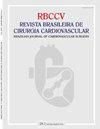c -反应蛋白与白蛋白比率作为经导管主动脉瓣置换术患者30天死亡率的一种新的基于炎症的标志物
IF 1.1
4区 医学
Q4 CARDIAC & CARDIOVASCULAR SYSTEMS
Revista Brasileira De Cirurgia Cardiovascular
Pub Date : 2022-03-03
DOI:10.21470/1678-9741-2020-0482
引用次数: 2
摘要
目的探讨C反应蛋白与白蛋白比值(CAR)是否能预测经导管主动脉瓣置换术(TAVR)患者的早期和晚期死亡率。方法本研究采用回顾性设计,包括170例平均年龄为78.4±7.1岁的TAVR患者。考虑到随访期,患者被分为2组,即死亡组和存活组。入院时采集全血细胞计数、血清CRP和血清白蛋白。计算所有患者的CAR值,并评估CAR与早期(≤30天)和晚期(>30天)死亡率的关系。结果中位随访时间为19[7-31]个月(最长66个月)。早期死亡率为20例(11.8%),晚期死亡率为39例(22.9%),其中大多数为男性(61.1%,P=0.04),较高的基线血清CRP水平和较低的基线白蛋白水平(P15.6预测早期死亡率,敏感性为80%,特异性为57%)。结论新的炎症标志物CAR可作为预测TAVR患者30天死亡率的可靠标志物。本文章由计算机程序翻译,如有差异,请以英文原文为准。
C-Reactive Protein to Albumin Ratio as A Novel Inflammatory-Based Marker for 30-Day Mortality in Patients Undergoing Transcatheter Aortic Valve Replacement
Objective We aimed to investigate whether C-reactive protein to albumin ratio (CAR) predicts the early and late mortality in patients undergoing transcatheter aortic valve replacement (TAVR). Methods This study was retrospectively designed and includes 170 TAVR patients with a mean age of 78.4±7.1 years. Patients were divided into 2 groups as those who died and those who survived, taking into account the follow-up period. Complete blood count, serum CRP and serum albumin were obtained on admission. The CAR value of all patients was calculated and the relationship of CAR with early (≤30 days) and late mortality (>30 days) was evaluated. Results The median follow-up period was 19 [7-31] months (maximum 66 months). Early mortality was observed in 20 (11.8%) patients, whereas late mortality was observed in 39 (22.9%) patients, most of them male (61.1%, P=0.04). Non-survivors had greater CAR value, higher baseline serum CRP level and lower baseline albumin level than survivors (P<0.01, for all parameters). According to multivariate analysis models, CAR (HR: 1.020, P<0.01) and TVAR score (HR: 1.294, P<0.01) were found to be independent predictors of early mortality while CRP and albumin were not. The area under the curve (AUC) for CAR was 0.73 with a P <0.01. A CAR >15.6 predicted the early mortality with 80% sensitivity and 57% specificity. Conclusion The novel inflammatory marker CAR can be used as a reliable marker in predicting 30-day mortality in patients undergoing TAVR.
求助全文
通过发布文献求助,成功后即可免费获取论文全文。
去求助
来源期刊

Revista Brasileira De Cirurgia Cardiovascular
CARDIAC & CARDIOVASCULAR SYSTEMS-SURGERY
CiteScore
2.10
自引率
0.00%
发文量
176
审稿时长
20 weeks
期刊介绍:
Brazilian Journal of Cardiovascular Surgery (BJCVS) is the official journal of the Brazilian Society of Cardiovascular Surgery (SBCCV). BJCVS is a bimonthly, peer-reviewed scientific journal, with regular circulation since 1986.
BJCVS aims to record the scientific and innovation production in cardiovascular surgery and promote study, improvement and professional updating in the specialty. It has significant impact on cardiovascular surgery practice and related areas.
 求助内容:
求助内容: 应助结果提醒方式:
应助结果提醒方式:


